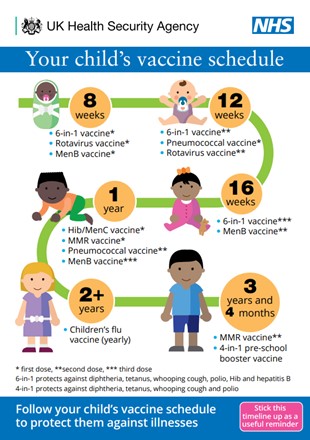Vaccinations
Vaccinations are a vital step in keeping schools and childcare settings safe and healthy! This page gives a clear overview of the recommended vaccine schedule for children, helping to protect against serious diseases. Discover which vaccines are essential at each stage, why they’re so important, and how they work to keep infections at bay. This is your go-to guide for understanding and supporting vaccinations in your school community.
When to vaccinate?
The University of Oxford’s Vaccine Knowledge Project breaks down vaccines by age and risk group, providing clear and scientific-based information for when you need it! The UKHSA has also provided a useful Complete Routine Immunisation Schedule, as well as the NHS: NHS vaccinations and when to have them.
Early Years
Most people receive their first vaccines when they are babies and by the age of four months, babies in the UK are protected against nine different infectious diseases. Toddlers and young children are offered vaccines to help boost their immunity from prior vaccinations and to protect against diseases they have not been vaccinated against previously.
Teenagers and young people:
The UKHSA Young People Immunisation Guide provides more information on the HPV, Td/IPV (Tetanus, Diphtheria, polio), and meningitis vaccines available to teenagers and young people.
Pregnancy:
Immunisation helps to protect you and your baby from infectious diseases, including flu, whooping cough, and German measles. Below are several resources that provide more information and can be shared to inform staff and families who are pregnant:
Vaccination during Pregnancy Information Leaflet
How to protect your baby from RSV
Why are vaccines so important?
Vaccines are crucial for keeping us healthy. They work by helping our immune system learn how to fight specific germs, which lowers the changes of getting sick. When many people get vaccinated, it creates herd immunity, protecting those who can’t be vaccinated, like people with certain health conditions. Vaccinations have successfully eliminated or greatly reduced serious diseases like measles, polio, and smallpox, saving many lives and preventing hospital visits. By getting vaccinated, we not only protect ourselves but also help our communities stay safe and healthy.
Here’s a quick illustration on the timeline of how and when vaccines were developed: Vaccine timeline
Vaccines are the most effective way to prevent and protect children and adults from many infectious diseases. There are four main vaccination programmes:
Further Resources
Supporting immunisation programmes - GOV.UK (www.gov.uk)
Flu vaccination programme 2024 to 2025: briefing for primary schools - GOV.UK
